DELEGATION OF AUTHORITY:OFFICE MANAGEMENT
"Delegation of authority merely means granting of authority to subordinates to operate within prescribed limits." -Theo Haimann
"Delegation of authority means assigning works to others and gives them authority to do it." -F.G.Moore
Thus delegation of authority is assigning works to others and giving them necessary authority to do the same works in effective manner.The concept of delegation of authority has develop due to the development of size of business and it's complexity.The manager has to delegate some of his right to subordinates along with specified responsibility.It is essential for the completion of works in effective and timely manner.
MEANING AND CONCEPT OF DERPARTMENTATION:OFFICE MANAGEMENT
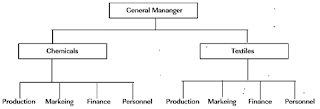
The process of logical grouping of similar nature functions into manageable units for the purpose of overall coordination of organizational resources is departmentation.In an organization many people perform various activities in different situation.Their nature,process and procedure may vary.It is not possible to perform all the works at a time and also by group of people.It is essential to classify activities into manageable units.the process of logical grouping of similar functions into manageable units for the purpose of overall coordination of organizational resources is departmentation.Thus departmentation divides the large and complete organizational function into smaller and flexible units to complete the work in efficient and effective manner.
"Departmentation is the means of dividing a large and monolithic functional organization into smaller flexible and administrative units" -Louis A, Allen
"The process of combining jobs into groups is termed departmentation" -Ivaneevich, Donnelly, Wilson
The concept of departmentation develops with performance of the work in systematic and efficient manner.Generally, works are divided into small manageable units according to the nature and entrusted to a departmental head.Departmental head is responsible for each and every work of the concerned department.
Departmentation maintain to facilitates to maintain communication, coordination and control among all the resources of the enterprise and finally contributes to gain organizational goals.It creates a separate unit with some independent responsibility to departmental managers who in turn improve their working efficiency and effectiveness.Besides, it also facilitates to supervise and to maintain control over all functional units and thus expansion of the organization becomes easier.
INFORMAL ORGANIZATION
Informal organization is also known as unofficial relationship which is not formed by the management.It is developed within the framework of the organization due to social interaction and interpersonal relationship.Man is a social relationship and wants to maintain social relationship with many social elements.When a large number of people work together in formal organization, they come to interaction with each others and develop personal and social relationship on the basis of their likes and interest.The development of such relation among members is informal organization.Generally, small informal groups are formed in large formal organization.These may be based on caste, ideology, language, religion, emotion, culture or tradition.
According to Chester I Bernard,"Informal organization is joint personal activity without conscious common purpose through contributing to joint result."
According to keith Davis,"Informal organization is the network of personal social relationships, not established or required by formal organization".
Thus informal organization is not predetermined but develops automatically among the members of the organization through friendship.
FORMAL ORGANIZATION
A formal organization is formed officially to achieve common goal.It is a structure of well defined jobs with a prescribed system of communication, coordination and delegation of authority.The structure is deliberately designed to enable people to work together for the achievement of common objectives.Under this structure there is a well designed job for each individual to make effectiveness of their efforts.There is a clear defined official relationship between superior and subordinates in the organization to achieve defined objectives.
According to SCOTT,"A formal organization is a system of coordinated activities of a group working towards a common goal under authority and leadership."
According to KOONTZ and WEIHRICH,"Formal organization means the intentional structure of roles in a formally organized enterprise."
Formal organization emphasis to work establish rules and regulation of the enterprise.There is a official line of communication among all the employees.There is a chain of official relation between superior and subordinate.Top level management play a key role to maintain coordination and mutual relation among all the formal structures to achieve common objectives.However, the achievement of organizational objectives depends upon ability of subordinates and management.
SPAN OF CONTROL
A supervisor can manage his subordinates according to his time availablity, his capacity and nature of work.In order to maintain attention to workand for effective completion of works, a managershould have a limited number of subordinates.
The concept of "SPAN OF CONTROL" was firstly propounded by V.A.Graicunas, a french specialist in 1933.The concept of span of control was propounded for effective management of human resource as well as to minimize supervision cost.A manager cannot supervise and control the large number of subordinate in effective manner.Similarly a small number of subordinate under a superior reduces cost of the organization.Thus span of control is essential to be maintain in the organization.
FUNCTIONAL ORGANIZATION:STRUCTURE OF ORGANIZATION
In functional organization, all the business activity of an enterprise are divided into a number of function and each function is entrusted to a specialist.Each specialist, to whom a function is entrusted , is known as functional specialistand authority delegated to each specialist is known as functional authority.For instance, the business activity of an enterprise might be divide into various functions like-production, perssonnel, marketing, finance, research and development,purchasing etc.
Generally, in functional organization the functional specialist communicates with each other through general manager .Here no functional specialist can providedirect instruction or suggestion to another functional specialist.
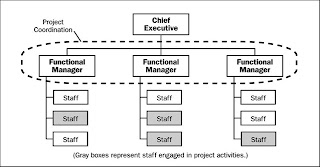
LINE AND STAFF ORGANIZATION:STRUCTURE OF ORGANIZATION IN MANAGEMENT

GROUP DISCUSSION
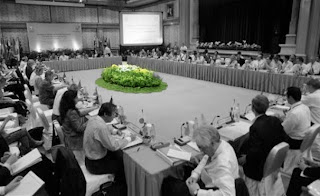
Group discussion have now become a sine qua non in various selection procedure. Whether it is recruitment in prestigious firm or admission in the MBA institute, aspiring candidates have to go through the rigors of the group discussion.
*what exactly is a group discussion?
Normally in a group discussion a leaderless group of 8-10 candidates is formed, and is given specific situation to analyze and discuss within a given time limit. The number of participants and the time limit given for discussions vary from situation to situation. A panel of moderates observers and evaluates them during the course of the discussions. Broadly, the moderators assess the candidates of the following points:
- command over spoken English
- communication skills
- knowledge
- convincing ability
- interpersonal skills
- problem solving skills
- conceptualizing skills
- leadership skills
- body language
- maturity
- creativity
- confidence
- assertiveness
- team spirit and,
- ability to take initiatives.
The key words here are 'perceived' and 'appear'. Always remember it does not matter how you rate your performance. What counts are the moderators' rating of it. Keeping this simple fact in mind will help you tremendously in focusing on your performance. You will not be able to use excuses like "I was legitimate in losing my temper as I was provoked".
A meaningful contribution implies that you have a thorough understanding of the topic and related issues, are able to structure arguments logically and are a good communicator. Also everybody can state the obvious. Be sure to bring in diverse dimensions to the topic so that your contributions leave a mark upon the moderators. To come across as a team player you have to listen to others' point of view and encourage a healthy exchange of ideas. You must carry people with you. So do not get emotional, do not shout, nor get into petty fights. If you have spoken and you notice that someone else has tried to enter the discussion on a number of occasions and has not had the chance to do so maybe you could give him a chance the next time he tries.
Your understanding of the topic, which in turn is determined by your reading habits, influences what you speak in the group discussion. If you are well read on diverse areas then coming up with good content will not be a problem. However, if you are not in the habit of reading newspapers then at least be prepared with "current issues in the press" for the group discussion. If you are applying for a job or to a specialized college chances are that your group discussion topic will focus on the your specialization or education. Be prepared accordingly.
You should initiate the group discussion i.e. be the first to speak , only if you have understood the topic clearly. Do not work under the assumptions that if you don't initiate - you lose points. On the contrary if you initiate badly you come under the negative focus of the moderator and suffer consequently.
One common complaint of many group discussion participants is that they did not get a chance to speak. The fact of the matter is that in no group discussion do you get a chance to speak. You have to create your chances. Also a widespread misconception among students is that only the "Leader" gets selected. This makes them commit the mistake of appointing themselves as a de facto leader of the group. You must never try to impose a system whereby everyone gets a chance to speak in turn. A group discussion is meant to be a free flowing discussion. Let it proceed naturally.
For cracking the group discussion one should be at your natural self and avoid putting on a show for the moderators.
The score you receive depends both on 'what' you say and 'how' you say it. Your gestures and mannerisms are more likely to reflect your attitude than what you say. One should be assertive and not dominating apart from being patient and one should also not lose his/her cool. Also, never get involved in one to one discussions with any participants. Bring in as many diverse aspects as you can to the discussion. Always be polite. Try to use phrases like :'I would like to share my views on........' or Yes' , I agree,but.If you have understood the topic in the correct light then do initiate the GD.Always address everyone in the group.
- Never be hesitant to speak if other are speaking.remember, you never interrupt anyone in the Gd-you must enter it.
- Never argue with anyone in the group members.
- Maintain eye contact with maximum members of the group as possible.
- Never change your stand on any issue during the group discussion.
- Keep your entire brief and to the stand.
- Finally, practice makes perfect.Mock GD sessions go a long way in improving your performance and confidence.
INTRODUCTION TO LINE ORGANIZATION STRUCTURE
According to McFarland,"line consist of direct vertical relationships, which connect to the position and task of each level with those above and below it."

Types of Organization
1.LINE ORGANIZATION STRUCTURE:
In this structure, there is a direct relationship from top level to bottom level through unbroken chain.
2.FUNCTIONAL ORGANIZATIONAL STRUCTURE:
All business activity of an enterprise are divided into a number of function and each function is entrusted to a specialist.
3.LINE AND STAFF ORGANIZATION:
In this structure, there is a provision of chain of commands,and besides, there is the provision of functional specialist to provide suggestion to the line managers in decision making.
Principles of Organization:Management
1.Unity of objective:
All the members working in the organization should have the same goals and objectives.
2.Specialization:
Works should be assigned to the individuals on the basis of their skill, knowledge and experience.
3.Co-ordination:
Co-ordination integrates efforts of all the members to meet common goals of organization.
4.Authority and Responsibility:
There must be a balance between authority and responsibility.
5.Unity of Command:
A subordinate should receive instruction from only one individual.So that the given instruction are clearly understood.
6.Scalar chain:
There should be unbroken hierarchy of relationship from top level to subordinate level.This emphasis on the clear instruction from top level to bottom level.
6.Span of Control:
There should be a limited numbers of subordinate under a superior.The number should not more which disturb everyone and maximizes supervision cost.
7.Exception:
only the top priority question should be asked to the superior.The small thing are an exception.
8.Simplicity:
The organization should be simple and easy to understand.
9.Flexibility:
The organization should be flexible so that the changes can be made according to the changing environment.
MEANING AND DEFINITION OF ORGANIZATION
*As a process-organizing is the process of defining and grouping function and maintaining authority-responsibility relationship among them.
*As a structure-An organization is the structure of relationship among various positionsfrom top level to subordinate level of an enterprise.
CONSTRAINTS OR LIMITATION OF PLANNING
*Lack of reliable data
Planning is undertaken on the basis of assumption and certainty of the future.This is not 100% accurate.hence future cannot be accurate since the data are not reliable.Thus planning for future risks uncertainty can give no perfect assurance.
*Time consuming process
The planning process requires a lot of steps and ladders.To overcome all the steps in one step is almost impossible that's why it is a time consuming process.
*Costly process
Since the information to be collected are of high numbers.People have to visit many places and spent resources to collect all the reliable information.Thus it is a costly process.
*Rapid change
Since the management deals about the human behavior and it is difficult to predict the living beings.so the plans set for one time may not be suitable for other time.
BENEFITS OF PLANNING PROCESS IN MANAGEMENT SYSTEM
1.Reduces uncertainty
2.Focus on Goals
3.Economical operation
4.Facilitates control
5.Encourages Innovation and creativity
6.Improves Motivation
7.Ensures better Coordination
8.Avoids Random Activity
9.Improves Competitive strength
All the above benefits can be achieved if the correct plan and policies are implemented in the organization.These can be helpful for the benefit of organizational goals.
Rational or Need for Planning

Planning helps the management to determine the goals and objective of the enterprise and ways of achieving the goals in the most effective manner.It ensures proper utilization of human resources.Without proper planning the activity of any enterprise are most likely to be haphazard.
As Billy E. Goetz has rightly remarked that "without plans, action will become merely random activity, producing anything but chaos.Thus planning is very essential to achieve consistent and coordinated structure of operation focused on desired goals/objectives.
1.Focuses on Goals:
All planning process is directed towards achieving organizational goals.The planning function brings the manager's attention to focus on the formulation of objective in clear-cut terms.
2.Offsets Uncertainty and Changes:
Planning means looking forward.It helps the organization to overcome potential danger and overcome the adverse effect to a large extent.
3.Economic in Operation:
planning avoids the concept of 'trial and error' or 'hit and miss' or random activities.It selects a course of action which is beneficial from organizational point of view.
4.Avoids Business Failure:
The basic motive of planning is to overcome the probability of business failure.The primary task of planning is to select a best course of action among many alternative.It helps reduce business uncertainty, better coordination, among all the member of the organization, unity of action and so on.Thus planning is the key to business success.
Principle of Management by Henry Fayol
This principle implies that every employees should be assigned only one type of work.The objective of division of work is to derive benefit from the principle of specialization.It add to the efficiency of labour.By this principle the, much more production is possible by the same amount of workers.
2.Authority and Responsibility:
The right to give order and power is called authority.On the other hand responsibility means the obligation to perform the assigned work.In any management process delegation of power, utilization of authority, and fixation of authority are the key to success.Authority without responsibility leads to irresponsible behavior while responsibility without authority will make a person ineffective.The success of management solely depends upon parity of authority and responsibility.
3.Discipline:
This principle of Henry Fayol means to obey the decision and the guideline of the superior.This principle is applicable both in management and the subordinate because all are with in the rules of the organization.In fayol view the superior can only expect discipline of subordinate only when they are discipline.
4.Unity of command:
A subordinate must get order from one and only one subordinate.So that he can complete his duties in the best possible way.
5.Unity of Direction:
This principle focuses that there should be one plan and one head for a group of activities having common objective.
6.Subordination of individual interest to general interest:
The first emphasis should be given to general interest rather than individual interest.The achievement of general interest ultimately contributes to the achievement of individual interest.
7.Remuneration of personnel:
The employees should be provided with correct amount of remuneration according to the performance.This makes the employees more loyal to their work.
8.Centralization:
Centralization reduces subordinate's role where as decentralization increases it.According to fayol, managers should retain final responsibility but the subordinate should be given much authority to do their respective jobs.
9.scalar chain:
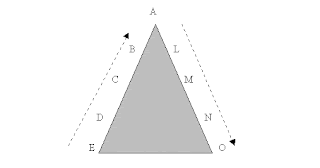
The management hierarchy must flow from top level to lower level.The scalar chain refers to the unbroken relation ranging from top level to lower level.This principle emphasis that the communication must travel from top level to lower ranking official so that every one has the clear concept about the current plans of the organization.
10.Order:
All the resources should be arranged in systematic way.
11.Equity:
Equity is the combination of kindness and justice.Employees expects equity from the management.It ensures healthy industrial relation management and laborwhich is essentialfor the successful working environment.
12.stability of tenure:
Employees must have job security.Frequent changes must be avoided.The moral of the employees will increase if they have job security and ultimately the organization will achieve it's goals.
13.Initiative:
Preferences should be given to the employees to think out plans on their own.
14.Esprit de corps:
This proverb means that "union is strength".It refers that there should be team work in the organization to achieve better result.
Description to Henry Fayol-Principle of Management
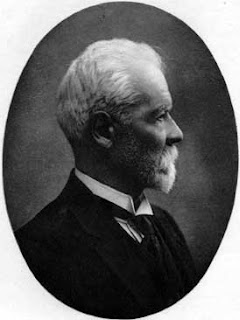
Henry Fayol (1841-1925) was a french industrialist.He joined french mining company in 1860 as an engineerand later became managing director in 1888.In 1916, he published a book known as "Administration Industrielle Generate".Henry Fayol's book was translated into english in 1929as "General and Industrial Administration".He has suggested 14 different principle of management.
